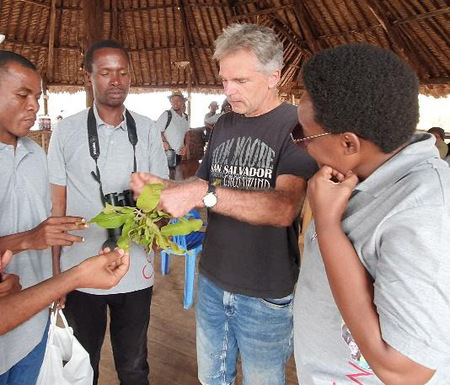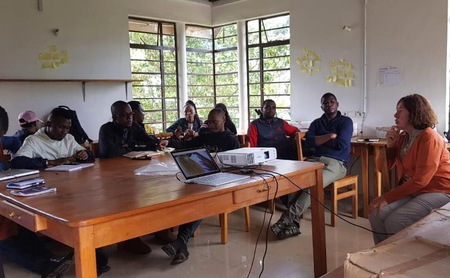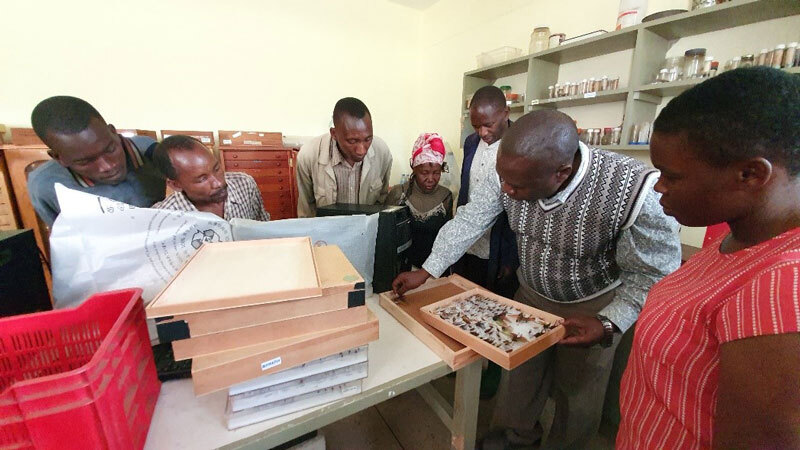


Four European partners (University of Florence, Italy; MUSE – Science Museum of Trento, Italy; Natural History Museum of Denmark, Denmark; University of Bayreuth, Germany and three Higher Education Institutions of Tanzania (College of African Wildlife Management – Mweka; University of Dar Es Salaam, Sokoine University of Agriculture) built a network to support conservation skills and strengthen scientific knowledge and improve training on biodiversity assessment and monitoring of tropical biodiversity. The joint project is funded by the EU program "Erasmus+ - Capacity-Building in the Field of Higher Education" under the name “CONTAN” (https://www.erasmuscontan.eu). The three-year program (until 01/2024) is designed to strengthen the quality of higher education in terms of content and organization, to promote access to higher education, and to establish suitable governance structures for this purpose.
The project team at the University of Bayreuth includes four members of the Chair of Plant Systematics: Prof. Dr. Sigrid Liede-Schumann and Dr. Ulrich Meve, both Africa-experienced taxonomists, as well as Dr. Claudia Hemp and Dr. Andreas Hemp, both of whom have been studying flora and fauna of the Kilimanjaro area in the context of ecological and climatic changes for decades. Further scientists from the Finish Environment Institute, Pekka Hurskainen, and Petr Blazek from IFER – Monitoring and Mapping Solutions, Prague, were contracted to complete the team. Comprehensive e-learning material was provided and included in the curricula developed, e.g. dealing with forest ecology, plant taxonomy and flower biology as well as arthropod studies in the field and acoustic monitoring of insects. The Nkweseko research station on the southern slopes of Kilimanjaro at an altitude of 1750 m has become an important hub for national and international exchange of experience (Scientific Station Nkweseko). Practical field training for CONTAN partners started at Nkweseko in September 2022. A total of 100 students and instructors from each of the University and Institute partners of the Project conducted their training units at the station adjacent to the Kilimanjaro National Park in Sep. 2022. An important part of the practical training encompassed technology for forest inventory and monitoring, to install permanent plots and recording the vegetation with the method of Braun-Blanquet (1964) as well as installing, reading out, and evaluating data taken by climatic loggers and gadgets – Dr. Andreas Hemp provided the relevant teaching. Petr Blazek introduced the method „field map“. This program is used for the allocation of forest ecosystems and data. Thus, it is possible to more easily determine the biomass storage of any given plot with a stand of trees. Prof Sigrid Liede-Schumann offered training on plant taxonomy and biodiversity monitoring. Students learned about flower morphology and how to describe a new species. Dr. Claudia Hemp led the groups to savanna habitats around Lake Chala at eastern Kilimanjaro where the basics of entomology were shown and students had to actively catch arthropods. These were determined with the help of available identification books. Already in July Dr. Pekka Hurskainen visited each of the three Tanzanian partners introducing and teaching GIS methods.


Bayreuth researchers and lecturers Andreas Hemp (left) and Sigrid Liede-Schumann with postgraduate students during the field practical training at Nkweseko Research and Training Station (Machame-Kilimanjaro)
Activities in 2023:

Head of Department Dr. Neduvotu Mollel and Dr. Andreas Hemp checking plant material donated by Dr. Hemp at Herbarium (NHT) of the Tanzania Plant Health and Pesticides Authority in Arusha (TPHPA).

Transferring insect material to the collections donated by Dr. Claudia Hemp (at National Entomological Collection of TPHPA, Tanzania Plant Health and Pesticides Authority). Aim is to build up a reference collection for Orthoptera, useful also to identify pest species.
